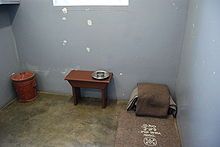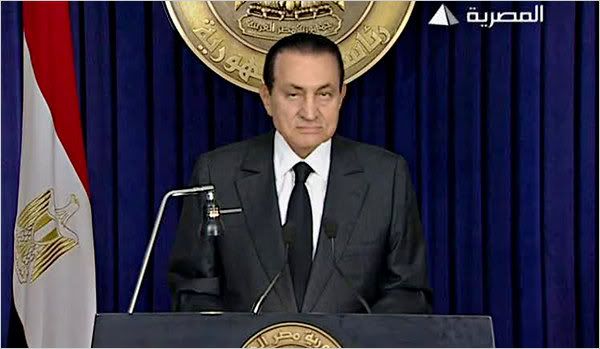Last night’s announcement by President Hosni Mubarak that he was not leaving office infuriated the Egyptian people who immediately marched from Tahrir Square through dark Cairo streets to the building of the state run television station for a loud but peaceful demonstration. Today portends to be another day of peaceful marches and protests with a planned march from Tahrir Square to the Presidential Palace. Protests are planned throughout the country but everyone is anxious with the rise in anger and Vice President Omar Suleiman’s speech that was taken as an offensive. Al Jazeera is reporting that “Egyptian military’s supreme council has held an ‘important’ meeting and will issue a statement soon”. So far the military has remained on the sidelines. They were, however, embarrassed by Mubarak’s continued refusal to leave office since they had made public announcement that indicated that the protesters demands were going to be met. Day eighteen promises to be large and loud and let us all hope peaceful and successful.
Here is some of the current news as the day has already begun in Egypt.
Mubarak’s defiance could spell disaster
The stubbornness of the beleaguered Egyptian president has embarrassed the army and endangered the people
Mubarak’s speech came at the end of an extraordinary day during which all the evidence seemed to indicate decisive intervention by the military, with officers telling protesters in Tahrir Square that their demands would be met.
Even more significantly, state TV broadcast pictures of the higher armed forces council meeting without Mubarak, the commander-in-chief, reinforcing the impression the generals and the defence minister, Field Marshal Hussein Tantawi, were moving against him. Tantawi is said to be close to and in close contact with the US government.
The council’s statement – the title “communique number one” redolent of past military interventions in Egypt and across the Arab world – said it would “remain in continuous session to discuss what measures and arrangements could be taken to safeguard the homeland and its achievements, and the aspirations of the great Egyptian people”. Omar Ashour, an Egyptian academic at Exeter University, said: “We may be seeing factional fighting inside the regime and in the end the Mubarak faction won. Or maybe we see him attempting to cling to power regardless of the views of the military. This is certainly embarrassing for them.”
Mohamed ElBaradei, the nearest the fractured opposition has to a single well-known leader, said Egypt’s fate now lay in the hands of the military. “The army must save the country now,” he said.
Military Caught Between Mubarak and Protesters
WASHINGTON – Even as pro-democracy demonstrations in Cairo have riveted the world’s attention for 17 days, the Egyptian military has managed the crisis with seeming finesse, winning over street protesters, quietly consolidating its domination of top government posts and sidelining potential rivals for leadership, notably President Hosni Mubarak’s son Gamal.
Then came Thursday, a roller coaster of a day on which the military at first appeared to be moving to usher Mr. Mubarak from the scene – and then watched with the world as Mr. Mubarak clung to his title, delegating some powers to Omar Suleiman, the vice president and former longtime intelligence chief.
The standoff between the protest leaders and Mr. Mubarak, hours before major demonstrations set for Friday, could pose a new dilemma for military commanders. Mr. Suleiman called for an end to demonstrations, and Human Rights Watch said this week that some military units had been involved in detaining and abusing protesters. But by most accounts, army units deployed in Cairo and other cities have shown little appetite for using force to clear the streets.
Barack Obama impatient for credible transition in Egypt
US president says Egyptian government has yet to put forward a ‘credible, concrete and unequivocal path to democracy’ after Mubarak refuses to step down
Barack Obama expressed dismay at the failure of Egyptian president Hosni Mubarak to stand down and said the Egyptian government has yet to put forward a “credible, concrete and unequivocal path to democracy”, as Egypt braced itself for what demonstrators predicted would be the biggest protests yet.
The US president’s patience appeared to be nearing its end after being wrong-footed and embarrassed earlier in the day by an expectation that Mubarak was planning to stand down.
American unhappiness with Mubarak was echoed by European leaders.
The White House, the state department and the Pentagon will be seeking explanations from their counterparts in Egypt as to what went wrong. Obama’s critics claimed he had been set up and the incident reflected his naivety.
The Obama administration had hinted early on Thursday that Mubarak was on the eve of departure. The CIA director, Leon Panetta, giving evidence before the House intelligence committee, predicted there was a “a strong likelihood that Mubarak may step down” by the end of the day.
U.S. Intelligence Chief Defends Reports on Egypt
WASHINGTON – The U.S. director of national intelligence sought Thursday to defend the intelligence community against criticism that it had failed to more clearly warn of the recent crisis in Egypt, saying that the buildup of potentially explosive pressures had been amply reported but that the specific triggers to action were far harder to predict.
“We are not clairvoyant,” said the director, James R. Clapper Jr., at a hearing of the House intelligence committee.
The intelligence community has faced criticism for failing to provide a clearer warning, or more timely descriptions, of the fast-moving developments in Egypt. President Barack Obama and other top administration officials have repeatedly seemed to be scrambling to catch up with events.
But Mr. Clapper, and also Leon E. Panetta, the director of central intelligence, suggested that it would always be difficult to know precisely when a potentially critical situation would turn explosive – to know, for example, when a frustrated merchant in Tunisia would set himself afire, an event that indirectly fed into the Egyptian crisis.
Europe’s Foreign Policy Chief, Struggling for Mandate, Faces Criticism on Uprisings
PARIS – After President Hosni Mubarak of Egypt refused to step down on Thursday night, infuriating demonstrators in his country, the European Union’s foreign policy chief, Catherine Ashton, issued a sharp statement saying that “the time for change is now” and that Mr. Mubarak “has not yet opened the way to faster and deeper reforms.”
Her rapid response was a marked change from the past few weeks, when she has been increasingly criticized as being painfully slow to respond to the crisis in Egypt and elsewhere, and as simply following an American script that has shifted several times with the flow of events.
It has been very difficult for Ms. Ashton, whose job was created in December 2009 by the Lisbon Treaty, to get ahead of the curve.
She must maneuver among the 27 member states – all with their own foreign ministers – as well as the European Union bureaucracy and the European Commission, run by José Manuel Barroso, who has foreign policy aspirations of his own. She is still struggling to build a staff and a new European diplomatic corps, and she must cobble together money and agreed positions from all the members.
Iran Presses Opposition to Refrain From Rally
TEHRAN – Iran’s authorities have increased pressure on the country’s political opposition days before a rally proposed by opposition leaders in support of the popular uprisings in Tunisia and Egypt.
Security forces stationed outside the home of the reformist cleric Mehdi Karroubi, one of the country’s most prominent opposition leaders, prevented Mr. Karroubi’s son from seeing his father on Thursday, according to the son, Hossein.
In an interview with an Arabic-language news Web site, Al Arabiya, Hossein Karroubi, who is politically active, said that the security forces told him that other family members, except his mother, were also barred from seeing his father.
The elder Mr. Karroubi and another government critic, Mir Hussein Moussavi, had submitted a formal request to the government to hold the rally on Feb. 14. Opposition Web sites have also reported the arrest of a number of people associated with the two opposition leaders. On Wednesday night, Taghi Rahmani, an activist close to Mr. Karroubi, and Mohammad-Hossein Sharifzadegan, a former welfare minister and an adviser to Mr. Moussavi, were arrested at their homes by Iran’s security forces. The Web sites also reported Thursday that two reformist journalists had been arrested.

 On this day in 1990,
On this day in 1990,  Mandela was imprisoned on
Mandela was imprisoned on 
Recent Comments